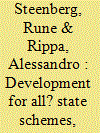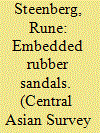|
|
|
Sort Order |
|
|
|
Items / Page
|
|
|
|
|
|
|
| Srl | Item |
| 1 |
ID:
164691


|
|
|
|
|
| Summary/Abstract |
The past decade of development schemes has been experienced very differently by various groups within the city of Kashgar in the Xinjiang Uyghur Autonomous Region of China. The recent exacerbation of social inequalities, stratification, and tensions in Kashgar is a structural consequence of two phases of government policies: an accelerated formalization of the economy and remodelling of the city-scape as part of modernistic development implemented before 2014, followed by a phase of strong securitization. Based on long-term ethnographic fieldwork between 2009 and 2017, this paper analyzes the situation, reactions, and strategies of different groups of Uyghur residents of Kashgar to cope with the changing socio-economic and political environment.
|
|
|
|
|
|
|
|
|
|
|
|
|
|
|
|
| 2 |
ID:
147196


|
|
|
|
|
| Summary/Abstract |
How does a group of Uyghur traders from a village in Atush (Xinjiang, China) end up with a stock of unsellable rubber sandals in Kadamjay (Batken, Kyrgyzstan), and why don’t they compete according to market principles? This article explores the social investments of the traders and their families, and reveals their behaviour to be rational, both economically and socially. It illuminates the business and daily life of Uyghur traders in southern Kyrgyzstan, an environment that is increasingly challenging and uncertain. The examination of exchange relations between their households explains why the traders cooperate as they do and also why they do not cooperate more. Economic rationales and social obligations prove to be mutually embedded. This insight expands and deepens a nascent analytical approach that recognizes social motivation for economic activities in Central Asia alongside undeniable economic incentives. This approach has much to gain from being more explicitly reconnected to classical anthropological theories of gift giving.
|
|
|
|
|
|
|
|
|
|
|
|
|
|
|
|
| 3 |
ID:
171126


|
|
|
|
|
| Summary/Abstract |
This article approaches ‘informal’ modes of organization among Uyghur bazaar traders in Xinjiang and Kyrgyzstan in a complex context of increasing state regulatory measures and strong social networks. It captures this organization as a ‘formal side of informality’. The practices comprising it are deemed ‘informal’ from a state-centred perspective, as they are not regulated by the state law or bureaucracy, but they still display a non-state formalization in the sense of being codified, regular and predictable to the traders. The article explores areas and examples of such ‘informal’ formality in the bazaar trade that are built around notions of morality, piousness, pride and shame. It pays special attention to oral contracts, purchase on credit, go-betweens and the status of profit. The article draws on participant observation and interviews in Xinjiang and Kyrgyzstan as well as on descriptions of trade morals and trade customs in ethnographic and folkloristic publications by local Uyghur scholars in Xinjiang.
|
|
|
|
|
|
|
|
|
|
|
|
|
|
|
|
| 4 |
ID:
177588


|
|
|
|
|
| Summary/Abstract |
This article traces the development of the modern concept of ‘Uyghur customs’ in Xinjiang, its rise to popularity in the 1980s-2010s and its demise after 2016. It argues that a certain modern notion of customs took shape in Xinjiang within the frame of modernization policies and the strengthening of formal bureaucracy. This notion, built on ideas introduced in the early twentieth century, defined customs as being distinct from politics, religion and economy. It provided Uyghur intellectuals with a politically safe space to write about local practices and construct Uyghur identity. These intellectuals were bridge builders between modern Chinese society and Uyghur communities. They used discourses around customs formulated in articles, books, TV-shows and teaching to envision a specifically Uyghur modernity. This cultural production ended abruptly with the detention of many of its protagonists and a general security clampdown on minority people and culture in Xinjiang from 2017.
|
|
|
|
|
|
|
|
|
|
|
|
|
|
|
|
|
|
|
|
|